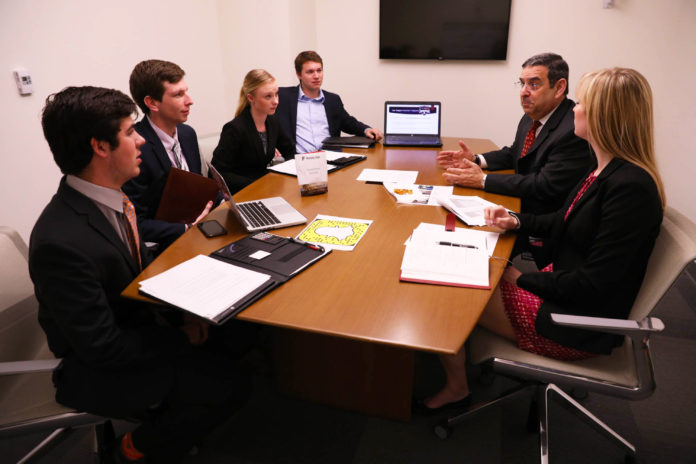
Most students in the professional selling program at Baylor only get to experience the selling side of the table, but Thursday morning’s role-play featured a senior who joined an executive on the buyer’s side of the exchange.
“It’s actually a great learning experience for me because I can think in the mind of a buyer, and the next time, in the mind of a seller,” San Antonio senior Margaret Newton said. “I have a better understanding of what the buyer might ask when I present something. It’s really valuable and a great learning experience that way. It’s also a great learning experience because these are my peers and my friends, so to learn how to be critical on one side of the table and then leave the room but still be friends with them.”
Newton participated in the team sale last year and was on the selling side of the table. This year, Newton faced the challenge of having to withhold information from her peers and not tell them about the curveball with which the buyers had planned to surprise the students. Carroll Fadal, vice president of sales for Texas Life Insurance and a Baylor alumna, served as the executive who was buying on Thursday and has been a buyer for the team sale on several occasions.
Students were expected to come in with an agenda for the meeting, but the curveball was that the buyers presented the sellers with an agenda that they wanted to see. This was meant to see how the students would react to a real-world situation and how they would adapt to a sudden change in the sales pitch without losing their cool. With the buyers presenting the sellers with a surprise agenda, the presentation and slideshow is out of order, forcing the students to think on their feet.
“From sitting on the other side of the table as a sales student, I know that would absolutely make me panic,” Newton said. “So I feel kind of mean being a sales student doing it to them, but it’s kind of fun to be on the other side.”
In yesterday’s team sale, students presented consumer- packaged goods to the buyers who role-played as a national grocery store. They asked the company “Salty Snacks” to come in with eight stock- keeping units; the ninth one that was up to them. Everything on a shelf in a grocery store is a unique stock-keeping unit. Students were asked to present the ninth stock-keeping unit, a food product and the total revenue that was expected to be generated from the nine stock keeping units in a pilot program and nationally. The students have been preparing for this since before spring break.
“I’m impressed that they’ve done some research, and they’ve put together a pretty decent business plan,” Fadal said. “Obviously it has holes in it, but they do a pretty good job of presenting it in a 20 minute interview setting.”
Fadal said to get verbal and non-verbal feedback as well as learning to adapt a presentation to what the buyer is looking for is invaluable for students. Real world simulations like this role-play provide more preparation than a theoretical classroom discussion, Fadal said. Students who participated in the role-play Thursday morning expressed their gratitude for learning how to prepare for various situations while still in school.
“We learned a lot,” Houston senior Thomas Scaff said. “After we went, we learned a lot, and if we would have known the knowledge we do now, we would have totally changed our presentation. That’s what this whole class [ProSales 2] has been.”
Port Neches junior Claire Brown said the ProSales program is set up a lot like having a real-world job. She said their professor acts more like a boss than a professor, which can be challenging but will pay off in the long run. Coppell junior David Dickens said it was a hard adjustment because many professors teach in class for interaction, whereas in the ProSales program, students are expected to go up to the professor and check in periodically like in a boss-employee relationship.
“No big sale or big presentation will ever go the way you expected it to,” Brown said. “We had to think on our toes and be ready for everything.”





